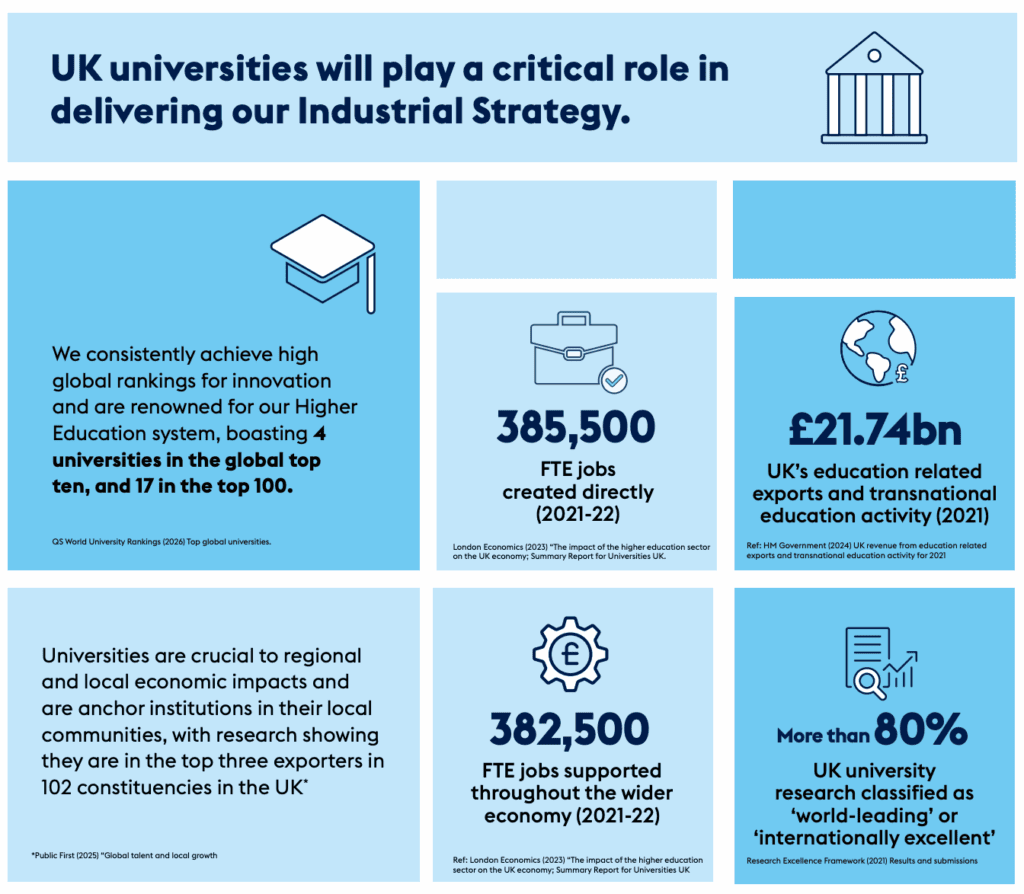- New strategy focuses on “getting the world’s brightest minds to relocate to the UK”
- Top Talent and High Potential Individual visa routes to be expanded
- £54m global talent fund formed to attract 10 world-class researchers and their teams to the UK
The UK government has released a new modern industrial strategy to provide a strategic framework for economic growth. Some £54 million is also earmarked to attract 10 world-class researchers to British universities.
The latest policy document provides further details on government plans to supplement domestic skills by attracting international talent, particularly in high-growth sectors and labour shortages.
International students who graduate in the UK will continue to be required to apply for the Graduate Route or Skilled Worker visa to access work rights.
However, international graduates from highly-ranked institutions elsewhere in the world can already apply for the High Potential Individual or Top Talent visa routes if they are eligible. The modern industrial strategy outlines expansion to both these routes as a way of attracting more talent into the UK.
“We will implement a capped and targeted expansion of the High Potential Individual route for top graduates, doubling the number of qualifying universities in line with the start of the next academic year, and reform the Global Talent visa to make it more accessible to promising top talent,” the government announced.
The expansion will also include increasing the range of fellowships which grant access to the Global Talent visa and Innovator Founder visa to encourage entrepreneurial talent currently studying at UK universities to start their own businesses.
A new global talent taskforce has been mooted, that will report directly to the Prime Minister’s office and the Treasury.
The aim will be to provide a ‘concierge service’ for top talent, using the country’s international network and UK diaspora to connect with elite individuals. The taskforce will also identify improvements to the UK offer to make country an attractive destination for them to relocate to.
In recent years, factors such as remuneration, inflation and immigration costs have all been major barriers to UK research and development projects attracting academic talent, in comparison to competitor destinations like the US and Australia.
Sarah Stevens, director of strategy at the Russell Group, responded to the announcement highlighting the need for immigration costs to be considered as a major barrier to attracting international talent. She said: “We welcome measures from government that support institutions to secure R&D talent from around the world. International researchers help support the UK’s research excellence and maintain valuable global links.
“We hope government will consider expanding this scheme in future to support more institutions, enabling more sectors and regions to benefit from this international talent. Government should also review upfront visa costs and ensure these are competitive and don’t serve as a barrier to international talent.”
The UK government also announced a £54m global talent fund aimed at attracting as few as 10 world-class researchers and their teams to the UK, covering relocation and research costs over five years.
Our world-leading universities, skilled workforce, legal and regulatory frameworks, tech ecosystem, and content creators have enabled the emergence of thriving, internationally competitive UK sectors.
The Higher Education Innovation Funding (HEIF), worth £280m to UK universities in 2024/25, remains in place despite continued calls for increased higher education funding from government, specifically for research intensive universities.
The strategy recoginises universities as central pillars of the UK’s competitive advantage, particularly in sectors such as AI, life sciences, and advanced manufacturing. HEIs are recognised not just as providers of talent, but as innovation engines feeding high-growth sectors and business incubation.


In May 2025, Universities UK released a report lobbying the government to recognise the significant role universities should play in UK business infrastructure.
After the modern industrial strategy was released, chief executive of Universities UK, Vivienne Stern, gave her reaction to the publication
“Today’s announcement sets a clear direction for the government’s priorities on economic growth in which universities have a vital role to play.
UK universities have forged strong partnerships with businesses across all major growth sectors and are central to developing the workforce and innovations of the future,” she said.
“As anchor institutions in communities nationwide, our universities are not only widening access and opportunities by helping individuals gain new skills or enhance existing ones, but are also centres of research and innovation, driving the UK forward. We’re pleased to see that the government recognises this and will continue to support universities through Higher Education Innovation Funding, which is critical to driving knowledge exchange between universities and businesses.”

